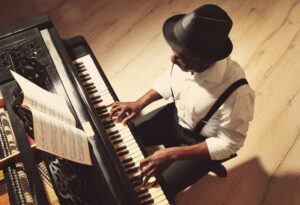Ever wonder what separates great piano players from the rest? It’s not magic—it’s practice. As a team of dedicated private music teachers, we’ve seen firsthand that consistent, intentional practice habits make all the difference. Whether you’re brand new to the piano or hoping to build stronger skills, learning how the best piano players practice can help you make faster progress and enjoy the journey.
Start with a Warm-Up
Just like athletes stretch before a workout, pianists need to prepare their hands and minds. A proper warm-up gets your fingers moving and your brain focused.
Try these basics:
-
Five-finger scales in C, G, and F major
-
Simple Hanon exercises for finger independence
-
Slow, hands-separate scales with attention to posture
Warming up consistently helps reduce tension and avoid injury—especially important for young learners or those returning to the piano after a break.
Break Your Practice into Sections
The best piano players don’t just run through songs from beginning to end. Instead, they zoom in on small sections and work through them patiently.
Use this method:
-
Pick one tricky passage.
-
Play it hands separately.
-
Slow it way down.
-
Add hands together once secure.
-
Loop it a few times before moving on.
This targeted repetition is far more effective than playing a piece straight through every time. This blog post on how piano practice can be fun offers more encouragement for building strong practice routines.
Practice Mindfully, Not Mindlessly
One of the habits that defines the best piano players is intentionality. Don’t just play until the timer runs out—set clear goals for each session.
For example:
-
“Today I’ll memorize the left hand of the first section.”
-
“I’ll improve dynamics in the chorus.”
-
“I’ll fix that one measure I keep missing.”
We recommend using a notebook or practice app to track goals and progress. Apps like Modacity are designed with musicians in mind and can help keep things focused.
End with Something You Love
After the hard work, treat yourself. Play something you enjoy, even if it’s easy. Ending your session on a high note (pun intended) helps maintain motivation and joy—two key ingredients for long-term success.
FAQ
How long should I practice the piano each day?
Beginners can start with 15–30 minutes a day. More advanced students may practice for an hour or more. Consistency matters more than total time.
Should I practice every day?
Yes, even short daily practice is better than one long weekly session. Daily repetition builds muscle memory and keeps skills sharp.
What’s the best way to fix mistakes?
Slow down and isolate the section. Repeating it correctly at a slower tempo is the fastest way to fix it for good.
By focusing on quality over quantity and using smart, focused techniques, even beginners can practice like the best piano players. Ready to get started with lessons that match your pace and goals? We’ll meet you right at your living room piano—virtually or in person.
